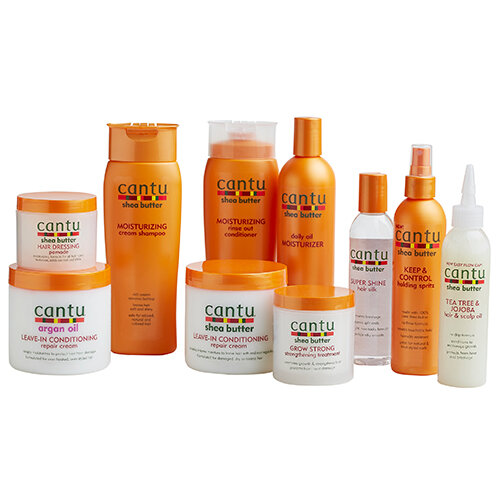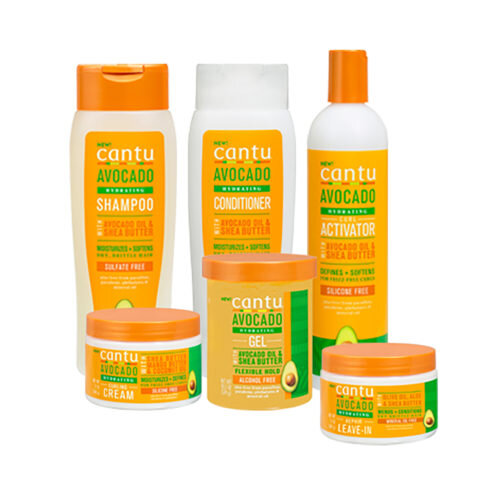Love Me or Leave Me
Surfactants are detergents, they are the cleaning agent in your shampoo. The most common surfactant found in shampoo is sodium lauryl sulfate. Surfactants are what removes oil, dirt and debris from your hair and scalp.
Occlusives, such a petroleum or dimethicone, are what gives hair slip, shine and softness but they produce a film on the hair that substantially blocks the evaporation of water from the hair shaft. What does this mean - with water being the first ingredient, it gets trapped and can penetrate the cortex– we want this because this allows your strands to have great elasticity and flexibility helping to minimize dryness, brittleness and breakage. In most of Cantu products they use petroleum as an occlusive, while most say there is no better product to use since petroleum comes from the earth – I say there is always room for improvement and healthier alternatives. When I hear the word petroleum, I think of my childhood days in the brutal winters of Brooklyn, NY when my mom would put what felt like half of the jar of Vaseline on my face as a protective barrier from the wind and cold.
Let that sink in for a minute. Petroleum as a protective barrier!
Some may say this is a good thing, but over time this causes major build up on the shaft/cuticle and the clogging of follicles, especially for those who are on this co-washing only bandwagon. Would you put Vaseline on your skin every day without cleansing in between? I truly hope you said NO! So why would you put a product on your hair whose second ingredient is petroleum on your hair day after day, or week after week without a thorough cleanse?
When a new client sits in my chair one of the many questions I ask are, “What products do you use at home for shampooing and conditioning?” and 91.21% of the time I hear ‘Cantu’! This is when my eyes roll, and I prepare to explain to the client why ‘Cantu’ is not for everyone who has textured hair.
I will say, personally I wanted to love Cantu. They have good ingredients in their products but, the continual use of their products coats the cuticle layer (outermost layer of your strands) in a way that causes the hair to start suffocating.
Water should always be the number one ingredient when were talking about shampoos and conditioners. Why? Because water is moisture, water is hydration and who does not want moisturized or hydrated tresses? Next to that should be your surfactants (if where discussing shampoos), occlusives, humectants and emollients anything after that is just a filler.
While dimethicone is an unnatural, man-made silicone substance – I find that it is much lighter and does not cause as much build up on the shaft as petroleum. So, this raises the question - is there a more natural alternative to occlusives such as petroleum and dimethicone? The answer is yes, aloe vera, jojoba oil and sunflower oil are healthy, natural occlusives that will give the same slip, shine and softness as petroleum and dimethicone. Most companies do not use these types of ingredients because of the price point. To keep products affordable often cheaper, harmful ingredients are used instead. This is not just with Cantu but with most hair products on the shelves these days.
Now, humectants are the ingredients such as honey, aloe vera, hydrolyzed wheat and rice proteins that absorbs moisture from the environment or helps create moisture retention within the shaft. While emollients are the ingredients such as plant oils and butters, that blocks moisture from entering and leaving the shaft. Disclaimer: Oils are not moisture. Oils are sealants – they seal in moisture, create shine and softness. I will say Cantu has done an amazing job adding in these natural humectants and emollients. The number of natural humectants and emollients in their products outweigh the number of synthetic humectants and emollients. Depending on the product your using in their collections, you will see humectants and emollients such as shea butter, honey, avocado oil, aloe vera gel, argan oil and many more listed on the packaging.
When shampooing clients who have been using Cantu as a Holy Grail, the few things I see they all have in common are:
The hair is extremely soft, which is slightly abnormal. Our hair skin and nails are acid, ranging 4.5-5.5 on the pH scale. Properties that are acidic tend to have a bit of texture in the feel. If the hair is silky or has major slip that is an indication that there may be some build up happening.
When running water over the hair to open the cuticle layer for shampooing, you can see the water beading down the hair shaft. At this point, a detox shampoo is needed to restore the pH of the hair and to remove the excess film off the shaft to normalize the porosity.
The hair has no curl definition but frizz.
By now you may be asking so who is Cantu for? In my professional opinion I would recommend Cantu to the client:
who has high porosity hair - this type of hair absorbs products very easily. High porosity hair tends to be a lot drier than low and normal porosity hair so the humectants that are in Cantu would be beneficial,
with normal porosity and/or medium textured hair,
Although I would highly encourage incorporating a detoxifying and/or clarifying shampoo into their hair regimen. In life, too much of anything is not good for you there needs to be healthy balance.
I would not recommend Cantu to the client:
who already has low porosity hair. Low porosity hair already has a hard time absorbing moisture, the continual use of Cantu would only make this worse,
with fine textured (the diameter of the strand not the feel) hair since they have so many emollients in their products this can cause the hair to become greasy or weighed down.
The next time you are product shopping, I hope you take the time to read the ingredient list to make sure you are purchasing something that will benefit the integrity of your tresses not harm them.
What products do you use at home for shampooing and conditioning?




